#why do we writers do this to ourselves?
Explore tagged Tumblr posts
Text
I was thinking about my story and I accidentally emotionally wrecked myself
#I was thinking about The Big Pain#i am both very excited to write it and also already emotionally exhausted#why do we writers do this to ourselves?#writing memes#me post#writeblr#writer problems
332 notes
·
View notes
Text
I may be writing a Big Moment from a different character's POV and it. um. it's a lot.
“Oh, no. Back on your feet, pretty girl.”
#lps the prince of thieves#lady whump#(implied)#why do we as writers do these things to ourselves?#who knows#i picked a tame quote#lol#but the speaker here just plain sucks#and it only gets worse from there 😅
25 notes
·
View notes
Text
Me: This new story I'm working on will be short. This time, for real.
The narrator: The story was not, in fact, short.
#writing life#writers life#fanfic writers#the lies we tell ourselves#why do I always do this#every time
30 notes
·
View notes
Text
I saw someone being like why did they make the mermaid scene, add new locations and the new characters if that much was cut from the budget..
And it's like what the hell do you think would've happened in the story without the new characters and new locations?? Those are very important parts of the second act of the story! The world has to expand with the characters and their development. Season 2 is about stede becoming a full fledged pirate, it's about ed trying to quit piracy. How the hell is the story supposed to show you that, if not for other pirates, other threats, other locations! Zheng is a new ally and ricky is the new antagonist, what happened with them in s2 will play a part in s3. ned low was there to mark the moment where we saw how stede is at the beginning of his career and ed being at the end of his!
Also, don't you dare speak ill of the mermaid scene!! You think the mermaid scene should've been cut?!! Are you serious?! That's kinda ed and stedes first reunion after being apart for MONTHS! That's the scene where ed, the kraken is (as he said) getting his life saved by his love, who appeared to him as a fantastic, orange and sparkly merperson!
I think we need to keep in mind that the show is about ed and stede, it's about their relationship but also about them separately, most of what happens in the show plays an important part in their story!
Also it's okay that jim and oluwande didn't have as much screen time as season 1. I understand people love them but other crew members deserve focus on too, it doesn't have to be about jim and olu every season! S2 we got to focus on izzy and we'll probably focus on Frenchie in s3 (since he's the captain now).
40% budget cuts is insane but honestly it wasn't as noticeable as it could've been. I enjoyed s2 so much, i thought it was great, the biggest problem i had was the pacing for the last 3 episodes and honestly it feels better on a rewatch. Genuinely the only thing i really wanted from season 2 was to see ed and stede reunite and the fact i got that and so, so much more is amazing and the fact the show did this amazing with 40% less budget is admirable!
#i do hope they get their budget back or at least more than what they had for s2.#like instead of saying they should've cut this or that maybe think about why those things weren't cut maybe remember that the show#is about ed and stede! and maybe also acknowledge how amazing of a job the writers and crew did!! because it is amazing!#we all were watching the first 5 episodes enjoying ourselves and now suddenly you think the show should've cut alot of what makes it fun!??#ofmd#ofmd s2#our flag means death#blackbonnet#hbo#👑
18 notes
·
View notes
Text
i think somewhere along the line (in my experience) after 2020 reader fan fic became less about enjoying a story and more about inserting ourselves into stories and idk how to feel about that
#i mean we are always meant to insert ourselves into stories in some capacity#that's the whole point#to get lost in a story in a world to empathize with characters to live in their shoes#but then things became about *seeing yourself* in a story and i think that's a slippery slope#ofc every one deserves to feel represented but it becomes a problem when you make that other people's problem#sure you can start a conversation about representation in media#but ff writers are just guys (gn) who do this for fun and for their love of writing#and i imagine it must feel really weird for someone to be like hey why did you give reader x trait that's not me like???????#do you tell published authors their mcs don't fit you???? like what?????#also as an aside personally for me self insert and in a similar vein self shipping is....a slippery slope#like yes when things are great it's fun to think abt me n my faves but also sometimes i hate myself & i DON'T want to think abt myself ykno#also this isn't meant to be discourse-y these are just my thoughts and i think part of why tumblr has felt weird for me in recent years#rina rambles
2 notes
·
View notes
Text
I highly HIGHLY encourage those who feel this way to spend some time commenting and encouraging writers whose work you enjoy because we’re burnt out and tired
fr tho why is everything smut😭😭 i wanna read angst that would ruin me, make me sick to my stomach and cry like there's no tomorrow bro i want a fanfic that is so devastating that i won't be able to function for the next few months
#not to say you aren’t doing that now#but I’m sure some of you just reading this and not commenting because you’re nervous or anxious are the ones I’m speaking to#writers love feedback#it’s as simple as that#without it we won’t continue#getting an I LOVE THIS isn’t always the feedback we want#we want to know WHY you loved it#otherwise we’re writing for ourselves#and unfortunately that can be smut#so if you want more angst find the angst and comment the heck out of that story#every detail#we want to gush about our work because we feel just as good as you did reading it#please please PLEASE comment more
11K notes
·
View notes
Text
How I learned to write smarter, not harder
(aka, how to write when you're hella ADHD lol)
A reader commented on my current long fic asking how I write so well. I replied with an essay of my honestly pretty non-standard writing advice (that they probably didn't actually want lol) Now I'm gonna share it with you guys and hopefully there's a few of you out there who will benefit from my past mistakes and find some useful advice in here. XD Since I started doing this stuff, which are all pretty easy changes to absorb into your process if you want to try them, I now almost never get writer's block.
The text of the original reply is indented, and I've added some additional commentary to expand upon and clarify some of the concepts.
As for writing well, I usually attribute it to the fact that I spent roughly four years in my late teens/early 20s writing text roleplay with a friend for hours every single day. Aside from the constant practice that provided, having a live audience immediately reacting to everything I wrote made me think a lot about how to make as many sentences as possible have maximum impact so that I could get that kind of fun reaction. (Which is another reason why comments like yours are so valuable to fanfic writers! <3) The other factors that have improved my writing are thus: 1. Writing nonlinearly. I used to write a whole story in order, from the first sentence onward. If there was a part I was excited to write, I slogged through everything to get there, thinking that it would be my reward once I finished everything that led up to that. It never worked. XD It was miserable. By the time I got to the part I wanted to write, I had beaten the scene to death in my head imagining all the ways I could write it, and it a) no longer interested me and b) could not live up to my expectations because I couldn't remember all my ideas I'd had for writing it. The scene came out mediocre and so did everything leading up to it. Since then, I learned through working on VN writing (I co-own a game studio and we have some visual novels that I write for) that I don't have to write linearly. If I'm inspired to write a scene, I just write it immediately. It usually comes out pretty good even in a first draft! But then I also have it for if I get more ideas for that scene later, and I can just edit them in. The scenes come out MUCH stronger because of this. And you know what else I discovered? Those scenes I slogged through before weren't scenes I had no inspiration for, I just didn't have any inspiration for them in that moment! I can't tell you how many times there was a scene I had no interest in writing, and then a week later I'd get struck by the perfect inspiration for it! Those are scenes I would have done a very mediocre job on, and now they can be some of the most powerful scenes because I gave them time to marinate. Inspiration isn't always linear, so writing doesn't have to be either!
Some people are the type that joyfully write linearly. I have a friend like this--she picks up the characters and just continues playing out the next scene. Her story progresses through the entire day-by-day lives of the characters; it never timeskips more than a few hours. She started writing and posting just eight months ago, she's about an eighth of the way through her planned fic timeline, and the content she has so far posted to AO3 for it is already 450,000 words long. But most of us are normal humans. We're not, for the most part, wired to create linearly. We consume linearly, we experience linearly, so we assume we must also create linearly. But actually, a lot of us really suffer from trying to force ourselves to create this way, and we might not even realize it. If you're the kind of person who thinks you need to carrot-on-a-stick yourself into writing by saving the fun part for when you finally write everything that happens before it: Stop. You're probably not a linear writer. You're making yourself suffer for no reason and your writing is probably suffering for it. At least give nonlinear writing a try before you assume you can't write if you're not baiting or forcing yourself into it!! Remember: Writing is fun. You do this because it's fun, because it's your hobby. If you're miserable 80% of the time you're doing it, you're probably doing it wrong!
2. Rereading my own work. I used to hate reading my own work. I wouldn't even edit it usually. I would write it and slap it online and try not to look at it again. XD Writing nonlinearly forced me to start rereading because I needed to make sure scenes connected together naturally and it also made it easier to get into the headspace of the story to keep writing and fill in the blanks and get new inspiration. Doing this built the editing process into my writing process--I would read a scene to get back in the headspace, dislike what I had written, and just clean it up on the fly. I still never ever sit down to 'edit' my work. I just reread it to prep for writing and it ends up editing itself. Many many scenes in this fic I have read probably a dozen times or more! (And now, I can actually reread my own work for enjoyment!) Another thing I found from doing this that it became easy to see patterns and themes in my work and strengthen them. Foreshadowing became easy. Setting up for jokes or plot points became easy. I didn't have to plan out my story in advance or write an outline, because the scenes themselves because a sort of living outline on their own. (Yes, despite all the foreshadowing and recurring thematic elements and secret hidden meanings sprinkled throughout this story, it actually never had an outline or a plan for any of that. It's all a natural byproduct of writing nonlinearly and rereading.)
Unpopular writing opinion time: You don't need to make a detailed outline.
Some people thrive on having an outline and planning out every detail before they sit down to write. But I know for a lot of us, we don't know how to write an outline or how to use it once we've written it. The idea of making one is daunting, and the advice that it's the only way to write or beat writer's block is demoralizing. So let me explain how I approach "outlining" which isn't really outlining at all.
I write in a Notion table, where every scene is a separate table entry and the scene is written in the page inside that entry. I do this because it makes writing nonlinearly VASTLY more intuitive and straightforward than writing in a single document. (If you're familiar with Notion, this probably makes perfect sense to you. If you're not, imagine something a little like a more contained Google Sheets, but every row has a title cell that opens into a unique Google Doc when you click on it. And it's not as slow and clunky as the Google suite lol) (Edit from the future: I answered an ask with more explanation on how I use Notion for non-linear writing here.) When I sit down to begin a new fic idea, I make a quick entry in the table for every scene I already know I'll want or need, with the entries titled with a couple words or a sentence that describes what will be in that scene so I'll remember it later. Basically, it's the most absolute bare-bones skeleton of what I vaguely know will probably happen in the story.
Then I start writing, wherever I want in the list. As I write, ideas for new scenes and new connections and themes will emerge over time, and I'll just slot them in between the original entries wherever they naturally fit, rearranging as necessary, so that I won't forget about them later when I'm ready to write them. As an example, my current long fic started with a list of roughly 35 scenes that I knew I wanted or needed, for a fic that will probably be around 100k words (which I didn't know at the time haha). As of this writing, it has expanded to 129 scenes. And since I write them directly in the page entries for the table, the fic is actually its own outline, without any additional effort on my part. As I said in the comment reply--a living outline!
This also made it easier to let go of the notion that I had to write something exactly right the first time. (People always say you should do this, but how many of us do? It's harder than it sounds! I didn't want to commit to editing later! I didn't want to reread my work! XD) I know I'm going to edit it naturally anyway, so I can feel okay giving myself permission to just write it approximately right and I can fix it later. And what I found from that was that sometimes what I believed was kind of meh when I wrote it was actually totally fine when I read it later! Sometimes the internal critic is actually wrong. 3. Marinating in the headspace of the story. For the first two months I worked on [fic], I did not consume any media other than [fandom the fic is in]. I didn't watch, read, or play anything else. Not even mobile games. (And there wasn't really much fan content for [fandom] to consume either. Still isn't, really. XD) This basically forced me to treat writing my story as my only source of entertainment, and kept me from getting distracted or inspired to write other ideas and abandon this one.
As an aside, I don't think this is a necessary step for writing, but if you really want to be productive in a short burst, I do highly recommend going on a media consumption hiatus. Not forever, obviously! Consuming media is a valuable tool for new inspiration, and reading other's work (both good and bad, as long as you think critically to identify the differences!) is an invaluable resource for improving your writing.
When I write, I usually lay down, close my eyes, and play the scene I'm interested in writing in my head. I even take a ten-minute nap now and then during this process. (I find being in a state of partial drowsiness, but not outright sleepiness, makes writing easier and better. Sleep helps the brain process and make connections!) Then I roll over to the laptop next to me and type up whatever I felt like worked for the scene. This may mean I write half a sentence at a time between intervals of closed-eye-time XD
People always say if you're stuck, you need to outline.
What they actually mean by that (whether they realize it or not) is that if you're stuck, you need to brainstorm. You need to marinate. You don't need to plan what you're doing, you just need to give yourself time to think about it!
What's another framing for brainstorming for your fic? Fantasizing about it! Planning is work, but fantasizing isn't.
You're already fantasizing about it, right? That's why you're writing it. Just direct that effort toward the scenes you're trying to write next! Close your eyes, lay back, and fantasize what the characters do and how they react.
And then quickly note down your inspirations so you don't forget, haha.
And if a scene is so boring to you that even fantasizing about it sucks--it's probably a bad scene.
If it's boring to write, it's going to be boring to read. Ask yourself why you wanted that scene. Is it even necessary? Can you cut it? Can you replace it with a different scene that serves the same purpose but approaches the problem from a different angle? If you can't remove the troublesome scene, what can you change about it that would make it interesting or exciting for you to write?
And I can't write sitting up to save my damn life. It's like my brain just stops working if I have to sit in a chair and stare at a computer screen. I need to be able to lie down, even if I don't use it! Talking walks and swinging in a hammock are also fantastic places to get scene ideas worked out, because the rhythmic motion also helps our brain process. It's just a little harder to work on a laptop in those scenarios. XD
In conclusion: Writing nonlinearly is an amazing tool for kicking writer's block to the curb. There's almost always some scene you'll want to write. If there isn't, you need to re-read or marinate.
Or you need to use the bathroom, eat something, or sleep. XD Seriously, if you're that stuck, assess your current physical condition. You might just be unable to focus because you're uncomfortable and you haven't realized it yet.
Anyway! I hope that was helpful, or at least interesting! XD Sorry again for the text wall. (I think this is the longest comment reply I've ever written!)
And same to you guys on tumblr--I hope this was helpful or at least interesting. XD Reblogs appreciated if so! (Maybe it'll help someone else!)
#creative writing#writers block#writblr#writers on tumblr#writing#writers and poets#writerscommunity#fanfic writing#writeblr#writing advice
28K notes
·
View notes
Text
You know, I think I found a strategy to survive writing the sequel to The Light of Stars.
I’m a pantser, and the good thing about pantsing is that (usually) jump around in the plot wildly (I have an outline, but my outlines tend to mean very little—you should see the first one for TLoS and the finished product. They are vaguely related, but that’s about it).
And the strategy is: Obliterate yourself with one chapter, then give yourself a couple of days with writing hilarious, weird or otherwise random stuff like scenes in kitchens, revolving around questions such as whether anything edible can be conjured from moonbeams, or if it’s a problem that cookies have the potential to break teeth. I kid you not, this is the shit these guys throw at me.
And once I’ve garnered enough strength, I will proceed to hurt myself again and actually cry while I’m writing, and they’re not tears of laughter…
Ah, the joys. So if most of what you read from me at the moment are random short snippets about cats or queued pictures:
This is why. I’m too busy laughing, crying or otherwise emotionally overexerting myself.
And now I’ll go back to crying…
Is November over yet?
#nano 2023#nanowrimo#the sandman#sandman fanfiction#the light of stars#my writing#writer things#writer problems#writing is emotional torture#but I think most writers secretly enjoy putting themselves through the wringer#because honestly why would we do this to ourselves otherwise
0 notes
Text
26 September: thread by WGA member David Slack
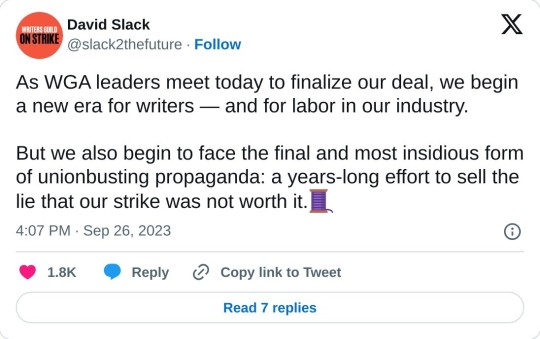
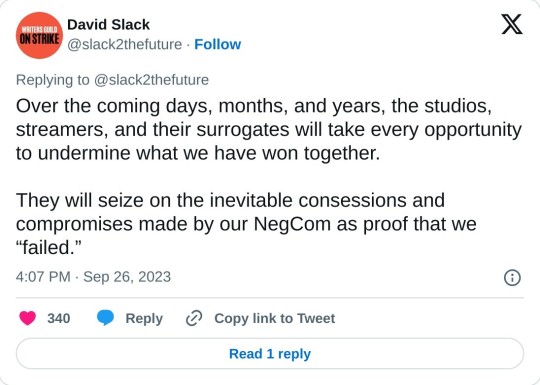
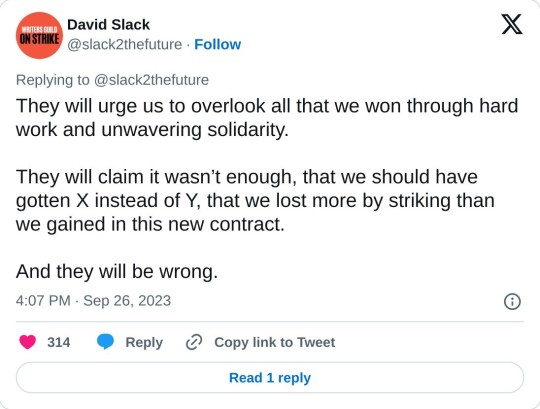
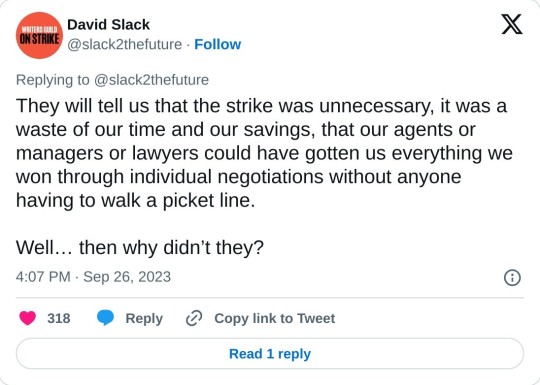
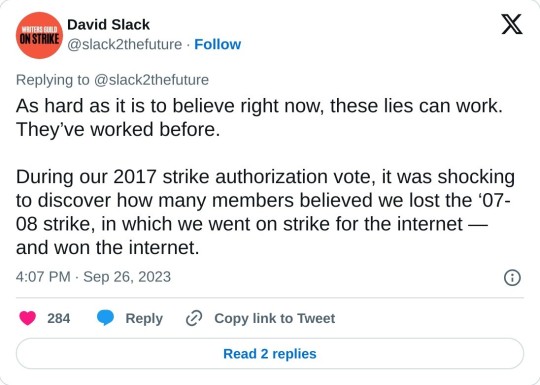
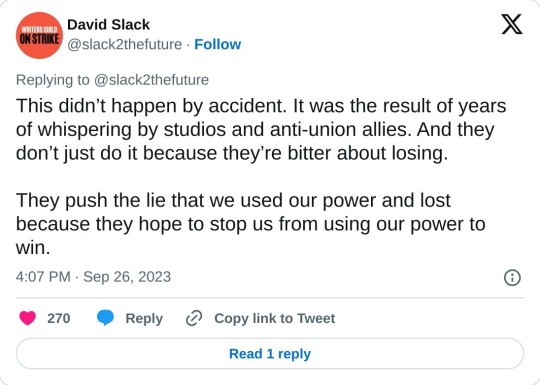
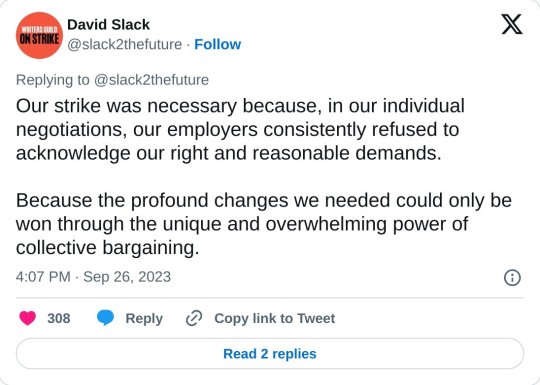
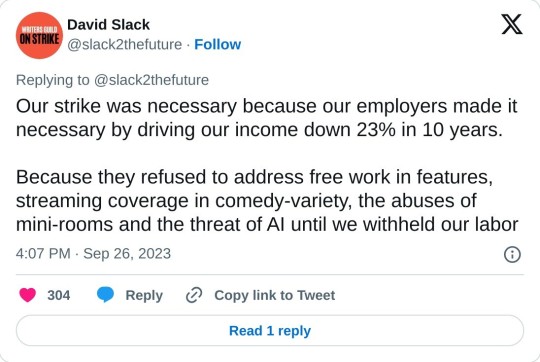
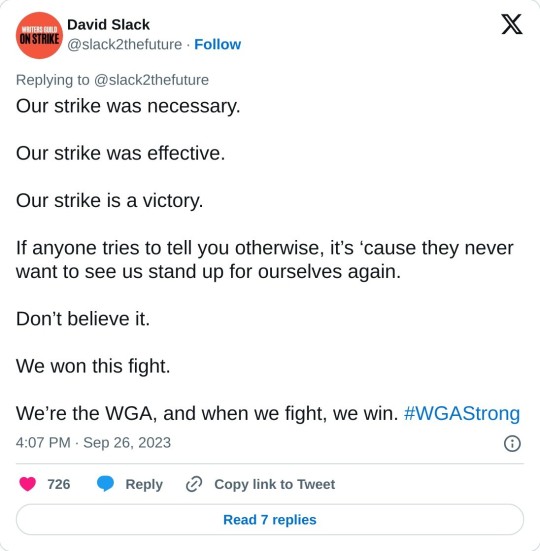
Twitter thread by David Slack @/slack2thefuture:
"As WGA leaders meet today to finalize our deal, we begin a new era for writers — and for labor in our industry. But we also begin to face the final and most insidious form of unionbusting propaganda: a years-long effort to sell the lie that our strike was not worth it.
Over the coming days, months, and years, the studios, streamers, and their surrogates will take every opportunity to undermine what we have won together. They will seize on the inevitable consessions and compromises made by our NegCom as proof that we “failed.”
They will urge us to overlook all that we won through hard work and unwavering solidarity. They will claim it wasn’t enough, that we should have gotten X instead of Y, that we lost more by striking than we gained in this new contract. And they will be wrong.
They will tell us that the strike was unnecessary, it was a waste of our time and our savings, that our agents or managers or lawyers could have gotten us everything we won through individual negotiations without anyone having to walk a picket line. Well… then why didn’t they?
As hard as it is to believe right now, these lies can work. They’ve worked before. During our 2017 strike authorization vote, it was shocking to discover how many members believed we lost the ‘07-08 strike, in which we went on strike for the internet — and won the internet.
This didn’t happen by accident. It was the result of years of whispering by studios and anti-union allies. And they don’t just do it because they’re bitter about losing. They push the lie that we used our power and lost because they hope to stop us from using our power to win.
Our strike was necessary because, in our individual negotiations, our employers consistently refused to acknowledge our right and reasonable demands. Because the profound changes we needed could only be won through the unique and overwhelming power of collective bargaining.
Our strike was necessary because our employers made it necessary by driving our income down 23% in 10 years. Because they refused to address free work in features, streaming coverage in comedy-variety, the abuses of mini-rooms and the threat of AI until we withheld our labor
Our strike was necessary. Our strike was effective. Our strike is a victory. If anyone tries to tell you otherwise, it’s ‘cause they never want to see us stand up for ourselves again. Don’t believe it. We won this fight. We’re the WGA, and when we fight, we win. #WGAStrong"
#wga strike#writers strike#union solidarity#i stand with the wga#sag-aftra strike#actors strike#wga strong#current events#david slack#long post#fans4wga
10K notes
·
View notes
Text
Why I don't feel disappointed by Vi's arc, but you might

I usually have pretty strong and polarizing opinions when it comes to my takes on Arcane, but this is one where I wanna open up the discussion a bit more and invite people to my perspective, and it's fine if you don't see it this way.
I think there are two primary reasons why people feel disappointed by the arc of s2 Vi. The first, being that Vi had stronger voiced concerns about the state of Zaun in the first season. The second, being that she spent the whole show wanting to be with her sister and she didn't end up getting that.
Why I actually feel fulfilled in Vi's arc has to do with these two points, and I invite you to sit with what I have to say next.
Both of these parts of Vi have to do with her fatal flaw: her neglect of self.
We know two things based on what the creators have said about the show: the theme of Arcane is the cycle of violence, and the entire show was written together, instead of season 2 being written after season 1 production. From this, I can then ask: what do the creators want to tell their audience about this message, knowing they wrote it all out together, knowing the events of season 2 were very purposeful, using Vi as a conduit for that message?
If violence is a cycle, can one person defy it? No, of course not. At the start of Vi's arc, she wants to be a person that breaks it, though. She wants to change things in Zaun, wants a better life for her sister. As season 1 continues on, she wants to pick up where she left off with Powder without truly processing the gravity of the years between them. She thinks she can hold the world on her shoulders and fix any problem that comes her way. She thinks she can use her fists to make progress, thinks she can physically reach out and create change, but it only contributes to the cycle. And that's not because she's morally in the wrong when she does so, but she doesn't grasp yet that her fists can't fix everything. Vander tries to tell her as such in act 1, and it's a lesson that goes beyond just the literal application.
Vi's tendency to try and fix everything around her leads to her neglect of self. Inevitably, when you try to change things you have no control over, it leaves wounds. It leaves a person feeling like something is deeply wrong with them. And we watch Vi go down this spiral. I actually find myself really brokenhearted watching Vi in the first 2 acts, because I think she represents a lot of us: we see pain and devastation around us, but we don't know what the right thing to do is. We try different tactics and try to fix things and are left wondering why things feel worse than how they started.
I think that's something a lot of viewers could benefit to reflect on: I think in watching a show with strong political messaging, we yearn for a message that tells us the answers to these big problems. Truthfully, most of us don't have a fucking clue what we're doing. We want change but don't know how to see it through. That includes the writers. This isn't a show about the solution to political strife. It's about the cycle of violence. It's about not knowing how to change something that's been continuous throughout history in some form.
If we put ourselves in Vi's shoes, it would eventually take a toll on us to try and change something that isn't within our ability to change. Vi can't fix the problems in Zaun. Vi can't change the way time and distance and pain has warped her sister into someone else. In season 2 act 1, she's still trying to take responsibility for things that are outside of her control. She blames herself for the way Jinx has changed and has to tell herself that the only way to fix it is to end the cycle with her own fists. She teams up with Caitlyn because she's convinced herself it's the only way she can help. She sees how violence has devastated not only Zaun but innocents in Piltover as well, and she feels responsible for it.
BUT SHE IS NOT AT FAULT. And she cannot fix it any more than she could have created it.
Perhaps people may feel Vi's arc is lacking because they wanted to see more of her involvement in the revolution of Zaun. They wanted to see her be able to change the situation with her sister and for them to live happily together. But because of the circumstances surrounding both, for Vi to do so, she would inevitably lean into her fatal flaw. She cannot do either of those things without neglecting herself. That's not who she is.
The whole point of a character arc is for someone to be a changed person from beginning to end. If Vi starts out as someone passionate about enacting change to the point of self-destruction, what would a resolution for a character like that look like?
Vi needs to choose herself. Vi needs to release herself of the responsibility of changing the world. She can't do it. There are ways to contribute to positive change that don't involve putting the world on your shoulders, and Vi has yet to put herself first in any situation. Vi choosing love is how she does it.
Amanda Overton, one of the main writers that contributed to Vi's character and the Caitlyn and Vi dynamic and relationship, said about Vi: "If she has no one left to protect, she would fall in love". If Vi finally lets go of this crutch of hers to protect, to fight, to take responsibility for things that aren't her burden to bear, she would fall in love. She would finally be able to choose something for herself.
This is why I find her arc fulfilling. I feel like it's not an arc we really see a lot. It's not every day we have a character that starts out like the classic anime slash marvel protagonist, and instead of being the person that saves the world, they accept they're not a superhero and it's okay to choose love and personal happiness.
If it applies, and you're reading this, I want you to ask yourself: are you perhaps disappointed with her arc because you expected her to be the superhero? And would you be okay with accepting that she isn't and doesn't need to be? That it would be better for her to choose herself?
#arcane analysis#arcane discussion#arcane discourse#arcane#vi ar#vi arcane#caitlyn kiramman#caitlyn x vi#caitvi#violyn#arcane league of legends#arcane lol#arcane league of lesbians
1K notes
·
View notes
Note
have you defined the meaning of “white woman brain” anywhere and if not, can you? /gen
Many Black and brown feminist writers have discussed this phenomenon and I encourage you to seek out a lot of writing about this subject, because there are a variety of perspectives, but to distill it, white woman fragility brain is a phenomenon that is not exclusive to either white people or to women, but is especially common among those who can weaponize white womanhood, and it consists of the following qualities:
A view of oneself as a helpless victim that is constantly in threat of being attacked, especially by strangers (even though statistically, this is not the case).
A refusal to consider oneself as capable of doing harm to others, especially a lack of consideration toward others' body autonomy or consent. (even while being highly concerned about one's own autonomy and consent).
A generally passive or passive-aggressive orientation toward the world: seeing oneself as a romantic or sexual object to be approached, but never wanting to initiate (or feeling that one never can), never feeling comfortable directly communicating displeasure or one's desires, believing that others instead must guess at it. (and then resenting people when they don't, but never expressing it).
A tendency to cry, excessively berate oneself, complain about being made to feel "unsafe," or give up when criticized or challenged, especially when challenged by people of color.
A tendency to associate a person's body type with how much of a threat they are. For example, feeling unsafe around people with penises and expecting a social space to accommodate that fear to cater to you, a fear of people who come from cultures where it's common to speak loudly, a fear of those who are large, assertive, and/or darker-skinned.
Instinctive fawning-type responses to stress, and a pattern of feigning happiness, agreeability, and ease when one is not genuinely feeling it, and expecting all other people (but especially other women) to feign happiness as well, paired with a deep-seated resentment of anyone who violates this illusion and expresses any negativity (being especially punitive toward women of color).
Instinctively "smoothing over" conflict between other people before it even begins, even when healthy conflict is necessary and not at all your business-- often performed by gossiping behind other people's backs, triangulating information when it is not yours to share, asking people to alter their behavior in order to avoid a reaction from somebody else, presenting your concerns as if they were somebody else's ("what will people think!"), tone-policing the airing of grievances, derailing hard conversations with more light-hearted topics, and excluding people who are known to be candid and assertive.
Here are some articles on elements of the phenomenon and why it is so dangerous:
Now, I single white cis women out a lot when I am describing this phenomenon, because they have the most to gain from exhibiting these qualities, but make no mistake: this is a pattern that many types of people can and do use. I have seen white trans women use white women's tears to silence critique. I have witnessed women of color being passive-aggressively derailed and silenced by a Black manager who was in a position of institutional power over them. Multiple of the women who sexually harassed me in the story linked above were not white. And LORD knows I see plenty of t boys falling back on this shit, as well as cis men from wealthy backgrounds. It's a mindset that has deep colonial roots and we all must be on the look out for it in ourselves and others, and we must be vigilant in uprooting it.
7K notes
·
View notes
Text
I love writing. The first thing I do when I get up is write, the last thing I do before I go to sleep is write. Between reading horror/fantasy/speculative fiction books, I read books on craft by anyone and everyone. My passions in life are the craft of writing AND storytelling.
Note: those are two different things. Having a story to tell and craft (the way we tell that story).
I am not saying that people who use AI to tell a story don't have a story to tell. They do! But that doesn't make them writers.
We have folktales across every culture about not accepting ourselves for who we are and that way leading to madness. Your version might go a little something like this:
A person who feels different than everyone else wishes to whoever is listening that they wake up beautiful/smart/charming. In the morning they wake to a mirror at the foot of their bed. Their reflection is all of those things! Filled with confidence, they go out into the world but, before meeting anyone, they catch sight of themself in a window. Their reflection normal but (having seen themself in the mirror) they now perceive themself as hideous.
They rush back home to check. In the mirror they're beautiful! What a relief. They stare deeply into the glass. Slowly their hair grows tangled and their clothing ragged. Days and weeks and months pass. They can't do anything without watching themself do it in the mirror. Dishes are done at the sink with the mirror blocking the window they used to love looking at the garden through. They wake with the mirror in bed with them rather than their lover. Etc, etc.
Using generative AI is like that mirror. Surface level, it makes things pretty. It may be entertaining and it may convey the story you want to convey.
But it's not your voice. It's your story, but not your voice. And it will trick you into thinking there is something wrong with your voice, that the way you tell stories is hideous, that you are incapable of the craft of writing. It will lie to you and you will live your whole life feeling disconnected from your own stories because something else is telling them for you.
That's why I'm against AI. Because I love writing. I love the way people tell stories, imperfect or perfect, because it's people telling them. Writers grow and change. Their punctuation choice, their word choice, their choice of form matter to a written story. There is connection in those decisions. A deeper level to a story that AI can never touch, only a person can.
So, please. Give your own voice a chance to grow and be heard.
750 notes
·
View notes
Photo
Photography by Simon Knott

Medieval stained glass fragment incorporated in a later window at the church of All Saints, East Barsham (Norfolk)
image from here
#i appreciate that OP added a source link‚ at least‚ but why is it that no one thinks photographers deserve to have their name ON their work!#this guy (simon knott) has gone to a great deal of effort photographing these churches and writing them up#and it's a labor of love that isn't profitable or even self-sustaining#and it's just like. can we really not even do him the courtesy of printing his name where people will see it as they view his work?#like. a link is all well and good but you're kidding yourself if you think most of your readers are going to click through#and it's just like. if i imagine producing written work and having someone recopy it without my (user)name on it#and just sticking a nondescript link at the end that said 'writing taken from here :)'?#makes my blood boil honestly! bet it would yours!#and so it's just like. can we not think this through and give visual artists the same respect we'd want for ourselves as writers#the level of casual thoughtless entitlement to images that the internet has produced in otherwise thoughtful people is really wild to me#over and over and over again you see people just. reblogging things a person produced‚ with no name on it and no regard for the fact#and so often these are people who make‚ or at least care about‚ art!#anyway sorry to go off it's just like. god. i know we're all tired but creators deserve better than this.#anyway:#whimsical#photography#churches#architecture#simon knott#and as ever:#credit is the currency of the internet economy#and you do a disservice to both the original creator and to readers who might like to learn more when you pass around uncredited work
17K notes
·
View notes
Text
There's a genre of post that I see pretty frequently, which can overall be summed up as, "Modern fandom has a culture problem where fanfic authors are treated as content producers instead of community members and their fanfic is treated as a commodity to be consumed instead of a high-effort labor of love that deserves attention and compliments given directly to the author". I agree with 3/4ths of that. I find the part I disagree with very interesting, the same way I find a lot of writeblr interesting, because it's a perspective that I had to work very hard to actually understand.
Because the posts have such a warped view of what writing is and why we post our writing! They say that fanfic fights against the commodified internet we live in, but all they're doing is changing the currency of payment in this attention economy. Another way you can summarize about 70% of these posts is, "My payment for writing and posting my fanfiction is compliments, and if you do not give me those compliments you are not paying. If you give those compliments behind my back, or talk about them privately without giving them to me as well, then you are stealing from me." I don't want to put it like that, but a lot of these posts use words like 'deprive', as if the reader who enjoys the fic without commenting is withholding something from them that they deserve. They use the word engagement, and they do talk about how part of that engagement is just the joy of talking about AUs and ships with other people, but when people say that comments are their motivation to keep writing, what they mean is that validation is their motivation to keep writing. Which is compliments.
I understand that, because I understand that fanfic writers are not immune to the attention economy. But I don't understand how almost every one of these posts talk about how this lack of attention makes them stop writing - that this act of theft is killing their desire to write. I could understand this if they meant 'desire to POST fic' (I don't post fic I think zero people would read.), but they talk about how lack of payment stops them from writing at all.
IMHO, that is what creates a commodity from fic. People want to treat fic as art, but an artist makes art for themself. Art is made because we want to hold parts of skills and ourselves in our hands. If you won't make art if you get no payment, then you have devalued the art completely.
We think of AO3 as this unique site that's born entirely from passion and is filled with fics written for love of the game. But guilt-tripping posts that shame people for not commenting on a fic they enjoy, and that describe how there's no point in writing fic if it's not getting attention, are directly contributing towards the culture of treating fic like a commodity.
I also really want a fandom culture where the relationship between artist and reader is reciprocal, where it feels like a community, and where I get to talk about my fanfic with people. My favorite part of posting fanfic is rambling about it on my blog, because I can talk about my art all day and I love it when people stop and listen. But I love that because I love my own art. If you love your own art, then it'll always have value.
Also Google your username, just trust me, that's how you find The Secret Discussions. Someone made a TikTok fansong of me once. WHAT?
#ftr wanting comments bc you're a newbie writer and you want reassurance that your fic doesn't suck is#the most normal and reasonable thing alive and everybody feels that way#im not saying it's bad to want comments. everybody wants comments. i want comments.#but i disagree with saying that people who don't comment are Killing Fandom America#i get that we want to build a healthy community and culture but a culture that focuses on making everybody fall in line#with the way they think things should be#isnt a community i want to be a part of
639 notes
·
View notes
Text
Crowned Flowers
Kamisato Ayato x Fem!Reader (Royal AU)
Summary: He's the Crowned Prince and you're just a commoner. You love each other but you had to keep your relationship a secret. Knowing it was the best to leave him alone and not make his life harder, you avoided him and no longer visited the castle. After years of pining for his first and only love, he is met with the sight of a little boy identical to him.
Warning: Slight Smut nothing intense
Tags: Slight Angst to Fluff, Royalty x Commoner
~•~•~•~•~•~•~•~•~•~•~
The young prince Ayato wasn't aware that such a cheap flower could bring about such beauty, yet a crown made of those cheap flowers laid on the head of a maiden he found strikingly admirable, he couldn't keep his eyes off you.
You were trying to catch the attention of other people around you, offering them a look of your basket of flowers, perhaps hoping that the flowers would be of interest to some people, and thus buy it off you.
"Sir..." The blue haired prince was shaken out of his trances, realizing that you had made your way over to him. You smiled at him with all the joy in your possibly pure heart. "Would you like to buy a flower? They're really pretty."
You didn't recognize him, probably because of his thick robe, covering the unmistakable blue hue of the hair of the royal family.
"Ahhh- Umm..." Ayato patted himself, looking for some mora to give you, but all his expenses are handled by his retainers, so he doesn't have anything on him. "I-I apologize, I don't seem to have any-"
You held up a flower for him still, "That's okay! I want you to take one for free! My mama said that giving something nice to others brightens up their day, and you can make good friends!"
He took the flowers in his hands, and never has the young prince felt so grateful for something so small.
Nobody knows why King Ayato's favorite flower is a cheap, white petaled flower that can be seen all over the kingdom. Surely someone of his status would love a rare, exotic flower only someone as rich as him could gaze upon.
But the sight of the beautiful flower reminded him of the love he unfortunately couldn't keep in his arms. The love that remained embedded in his being, never letting him forget the face that brought upon color in his world, the hands that cradles his face and caress his cheeks ever so softly, the body that he forever wants to hold close to his own, though he probably could never again.
The crowned king Ayato could only reminisce about the love of his life.
"The young prince is missing again!" Yelled one of his guards, his voice laced with worry, less for the prince and more for himself if he doesn't bring the prince back to the palace immediately.
The panicked guard yelling for help at the other guards drew a little giggle from you, making you cover your mouth to avoid making too much noise. You were hiding behind the tall fence of the local orphanage, Ayato next to you sitting close, trying not to laugh as well.
"Looks like we got some time for ourselves." He whispered, his face awfully close to yours. You smiled brightly, as you usually do, cuddling up to him.
"Your parents might kill you..." You rest your head on his shoulder, prompting him to wrap an arm around you. You sighed in contentment, hearing the fading frantic footsteps of the guards.
"I don't think I mind having this as my final moment before my parents kill me." You playfully slapped him on the chest due to his statement.
Ayato then had a thought, "Maybe... they wouldn't be disapproving of our relationship like we thought." He tightened his hold of you. ''Perhaps, we can finally-"
"It's unheard of, couples like us." You spoke sadly, sighing after. "It's only in those teenage fanfiction books does the commoner get the prince."
Ayato didn't want to admit that you were right, there was a low chance that his parents would allow him to marry a commoner, much less would the royal court.
He chose to end the topic with a joke. "Well then, I hope the writer of this story knows the decorations I want for our wedding." He basked in the smile that your lips formed.
As the king of his kingdom, he was expected to produce an heir to the throne within the first five years of his reign, yet he had not stuck to this expectation, he had not even chosen a bride.
It feels as though his heart is tied to only one, and no other lady could capture him in a loving blanket of eternal bliss in which you caged him in.
And no other could satisfy the hunger that you satiated during your first (and last) night together.
"I still wish to see you after this..." He says in a breathless moan, his hand landing on your hips as you grind yourself closer to him. "Archons, my queen..." He hisses, shutting his eyes at your moves above him sending him to absolute euphoria.
Your fingers poked at his cheek before your palm made contact, caressing it to opt him to open his eyes. You smile softly at him, "You have a duty..."
In the dim light of the moon illuminating from the windows of his room, you looked absolutely radiant, completely naked for him to devour with his eyes. His hips instinctively jerked up at the sight, making you whimper at the sudden sensation.
"I have a duty to the woman I love..." His own hand reach for your face, cupping your cheek. "I fucking love you..."
He had never felt such raw and intense emotions, but being bare and romantic with you within the warmth of his abode, showered by the cascading light of the moon truly made him love you even more.
You lean into his touch, closing your eyes as you start to move on his lap, letting him caress your insides. "I love you, I love you too..." You whispered, letting it mix with the moans that leaves your mouth.
After your intense, romantic, sweet love-making, you left his life with one last kiss to remember him by.
He's never seen you since then.
Sometimes he even thinks that you were just a figment of his imagination, his version of perfection within a girl that he would hopelessly fall in love with for the rest of his life.
But, as he stares at the scene in front of him...
"Flowers! Fresh flowers here! So pretty, it'll make you fall in love!"
...that young boy, selling white flowers in a somewhat familiar, worn-out basket, hair covered with a cloak, but his eyes... that unmistakable tint of purple that only one member of the royal family has.
His heart then drops, as the door of the house behind the little boy opens, revealing... you.
You... 're so beautiful...
A version of perfection within a girl that he would hopelessly fall in love with for the rest of his life.
"Your Majesty, the royal guards are done with their business here, we may go if you would allow us." A guard stood beside him, unbeknownst to the conflicting feeling swirling within the king.
"Yes, go..." Ayato refuses to take his eyes off the scene in front of him.
"And you, your Majest-" The guard could not finish his question before Ayato was walking up to the boy holding the basket.
"Sir with the crown! You want flowers, right?" As their gazes meet, the purple-eyed boy pointed at him and shouted excitedly.
Ayato chuckled, taking out a pouch of mora from his suit and kneeling down to the boys level. "Would this suffice for one lovely flower?"
"Wow! That's for a whole basket!"
"You can have it, I've been thought that giving something nice to others brightens up their day, and you can make good friends."
"My mommy says that!" As the boy exclaims, a figure walks up behind him, opting Ayato to look up.
"I know she does..." Though he is filled with conflicting emotions, he still smiles at you. "My queen says that."
"Is mommy your queen, Mr. Crown?"
Your eyes lock onto his, your gaze softening. "King Ayato... I'm sorry for my child..." His eyes seem to darken as you refer to your son as only yours.
Ayato gently places a hand on the little boys hood, lifting it off a little to reveal the same shade of blue hair as his. "Hmm... a very handsome young prince..."
The boy silently tugs at your skirt. "We're secretly royalty, mommy." He giggles, making his father smile.
"Yes, nobody would go against a king for declaring his beloved as a royal, to be by his side. " Ayato smiles proudly.
For the longest time in his life, he had always wanted to just hold you without worrying about the eyes of the public, and as he shamelessly holds out a hand to cup your cheek, he has fulfilled one of his many wishes.
"You can run from a crowned prince, but not a king, my queen." He pulls you in for a kiss, and despite to nosy eyes of your neighbors, you let him.
And you don't have to run away again.
~•~•~•~•~•~•~•~•~•~•~
The little boy is unnamed, cuz I suck with names, so comment what you would name your little love child with Ayato!
Also, I found this in my drafts, it was like from a year ago and I read it and I can't believe it's so... beautifully written?? (not tutting my own horn, I was just truly impressed that I could come up with this, I mean, you guys read my smuts >:)) Anywayyy, hope you like it!
#genshin impact x reader#genshin impact imagines#genshin impact#genshin impact angst#genshin impact fluff#genshin impact ayato#kamisato ayato x reader#kamisato ayato angst#kamisato ayato fluff#genshin smut
940 notes
·
View notes
Text
do homicipher characters experience arousal?
i want to preface this by saying that i am not in any way, shape, or form criticizing other homicipher writers and/or their headcanons. i absolutely adore the work i’ve seen from everyone and am grateful to be able to read it! this is simply my personal thoughts on this topic so i hope it doesn’t come across like i’m trying to demean anyone else’s work.
additional note: i write reader insert so i will be referring to us as the reader rather than mc, but my post should work for both interpretations ^^
this is something i’ve been thinking about a lot since i’m working on some nsfw homicipher headcanons myself. from what i’ve read, a lot of homicipher work headcanon the characters as not really experiencing and/or knowing what arousal is, at least until they meet the reader (which is extremely endearing and flattering, i love the concept, and there’s nothing wrong with it!) but i personally came to the conclusion that homicipher characters do experience arousal, and have experienced it before meeting the reader. however, i believe their perception of arousal differs from ours.
to start, the reason i think they experience arousal to begin with, is because arousal isn’t just an emotional or mental response, but also a physiological function. similar to other physical needs (ie: food, sleep, water)—which i think they also require though that’s for another post—arousal doesn’t necessarily require conscious thought or emotional processes. arousal can be merely a response to touch or certain sensory inputs, something that happens regardless of how we think or feel.
while i think arousal is a natural function for them, i don’t believe they are likely to have had sex with other homicipher characters. the reason for that is also why i say they experience arousal differently—they don’t understand attraction. this is based on both my personal bias of wanting them to ourselves, but also the in game interactions with mr. hood and mr. silvair, where they fail to grasp the concept of ‘liking’ an individual.
since they don’t experience attraction (yet!), i imagine their perception of arousal would be a mechanical or instinctual one; just something their bodies respond to. much like thoughtlessly scratching an itch, they likely address it more as a physical need to take care of, rather than associating it with any deeper desires or having it directed/related to another person.
my silly little reader insert loving self does insist that they feel some sort of attraction towards us, though, which i believe will be a newfound feeling for them that can change how they experience arousal. with them able to feel attraction towards us, their once neutral and unassuming need can become something more intimate, romantic, or even obsessive depending on the character.
tl;dr homicipher characters have always experienced arousal but only as a bodily function, as they don’t understand attraction until meeting and developing interest in the reader, which changes their perception of arousal to something more complex and intimate.
thank you everyone for reading my silly little shower thoughts. i hope this was coherent enough and made sense! (>^ω^<)
feel free to leave any of your thoughts below if you have any comments on this! and feel free to argue with me if you think i’m yapping nonsense... (・・;)
#homicipher nsft#homicipher x you#homicipher headcanons#homicipher smut#homicipher fanfic#homicipher fanfiction#homicipher game#homicipher x reader#homicipher#homicipher headcanon#mr scarletella#mr crawling#mr gap#mr hugeface#mr hood#mr silvair#mr chopped#mr scarletella x reader#mr stitch#mr crawling x reader#mr machete#mr masque#mr gap x reader#mr crawling headcanons#mr hood smut#mr hood x reader#mr scarletella smut#mr silvair x reader#mr silvair smut#mr machete x reader
512 notes
·
View notes